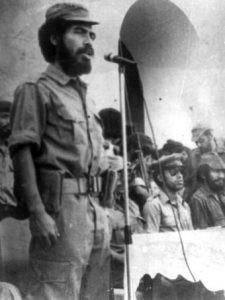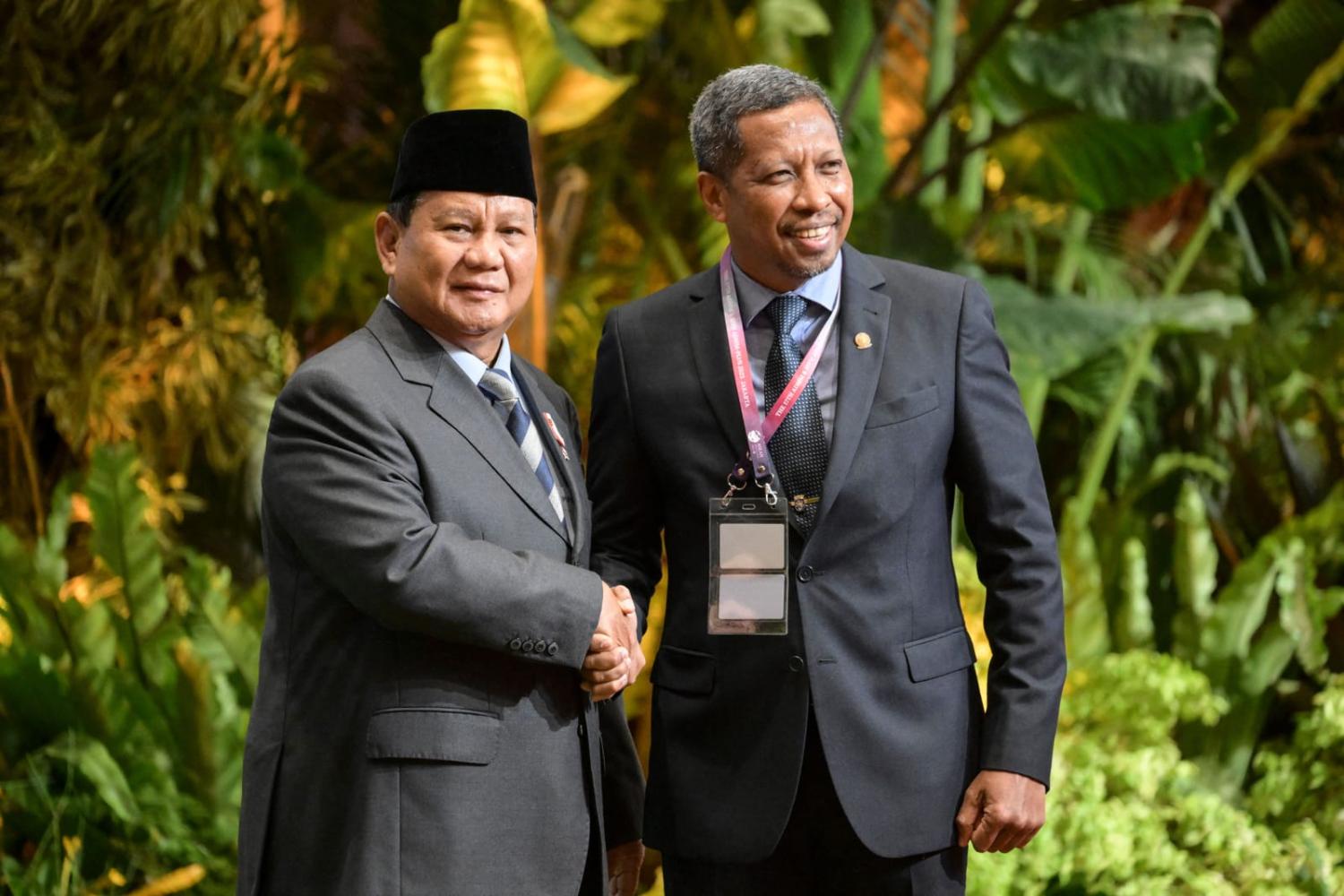Prabowo Subianto’s recent election win has sparked varied reactions, and while some interpret it as a setback for democratic progress since the 1998 reformasi, I see it as an opportunity for fostering deeper reconciliation between Timor-Leste and Indonesia.
Despite the strong ties between the two nations after the 24 year Indonesian occupation, characterised by robust diplomatic relations, unrestricted citizen travel, open trade, and significant Indonesian business presence, unresolved issues persist. Among these are the finalisation of the land border, particularly the dispute over Naktuka island, and lingering questions such as the whereabouts of the remains of independence leaders, notably Nicolau Lobato, Timor-Leste’s first prime minister (pictured making the declaration of independence in 1975). Lobato was killed in a military operation led by Lieutenant Prabowo Subianto in late December 1978 and despite numerous inquiries since independence in 2002, Timor-Leste has yet to locate his remains. There is a rumour that Lobato’s body was interred in a military cemetery in Jakarta after being transported to the Indonesian capital for identification.
In 2014, Prime Minister Xanana Gusmão urged the Indonesian veteran corps, led by retired general Agum Gumelar, to initiate the search for Lobato’s remains. In response, Gumelar agreed to lead a fact-finding team, but their visit to Timor-Leste later that year yielded no results. Even with Gumelar’s reassurances and subsequent efforts by Foreign Minister Aurelio Guterres in 2018, the Indonesian government did not respond to the Timorese plea.

Although most Timorese support reconciliation with Indonesia, these unresolved issues hinder a profound healing process. For many Timorese, the past remains unresolved, with lingering questions about the fate of their loved ones. This lack of closure complicates trauma healing and dampens optimism about the future. This issue remains relevant, as reflected in the themes explored by East Timorese artist Maria Madeira, whose work displayed this year at the Venice 60th Biennale focuses on trauma, hope, and healing.
In this context, Prabowo’s presidency offers promise. His authority can compel the military to disclose records from the occupation era, drawing on his background as a former influential operational commander linked to the late dictator Suharto. This transparency could lead to the identification and repatriation of Timorese leaders’ remains, offering closure and signaling progress. Prabowo’s visit to the Indonesian hero’s cemetery in West Timor last September demonstrated respect for those involved in the conflict. Now, he must honour former adversaries with dignified resting places.
This year, in a 13 February interview with podcast host Deddy Corbuzier, Prabowo expressed admiration for Timorese FRETILIN fighters, recounting an encounter with a captured wounded fighter who displayed noble “kesatria” qualities. When Prabowo asks in Tetum if he wants to live or die, the Timorese replies: Mate bele, moris bele! (Up to you. I may live or die). Hopefully, this respect will guide Prabowo in disclosing burial sites and facilitating the return of corpses, such as Nicolau Lobato’s, demonstrating magnanimity and enabling both nations to move forward.
The recent phone call between President Jose Ramos-Horta and Prabowo following his Indonesian election victory is a positive step. It is hoped that Prabowo will accept Ramos-Horta’s invitation and choose Timor-Leste for his first overseas trip, presenting an opportunity for deeper engagement and personal redemption. Prabowo’s involvement in events in Timor-Leste has tarnished his international reputation, particularly his alleged role in the military operation that killed Nicolau Lobato and accusations of war crimes in Kraras. Visiting Timor-Leste and confronting history could offer an opportunity for Prabowo to reconcile with his past.
While suggesting that Prabowo also requires confronting his own past may appear naive to some, Timor-Leste remains deeply ingrained in the memories of numerous current Indonesians who served there during their army years. In recent discussions with these individuals, I was struck by how their experiences in Timor-Leste continue to affect them. Hence, it is not unreasonable to propose that confronting the past in Timor-Leste could also provide closure for Prabowo and his associates.
While it’s unrealistic to expect the location of all remains, starting with information about Nicolau Lobato’s whereabouts would be a significant gesture, especially as Prabowo likely enters Timor-Leste via Dili airport, named after Nicolau Lobato.

